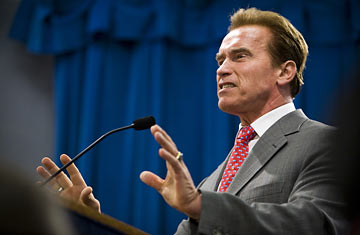
Governor Arnold Schwarzenegger speaks during a news conference at the State Capitol in Sacramento, California
(2 of 2)
Business leaders and other civic leaders, meanwhile, are rallying behind the idea of a constitutional convention. That, of course, could be a can of worms. Erwin Chemerinsky, a leading constitutional scholar and dean of the University of California Irvine Law School, argues that advocates for budget sanity should first try a ballot measure to change the two-thirds vote requirement on budget and tax measures. "If a statewide initiative to eliminate the two-thirds majority requirement can pass, that will solve a lot of the problem," Chemerinsky says. "And then it makes sense to move on to a constitutional convention."
But the convention idea is already caught up in the politics of Proposition 13. A draft initiative for such a convention reads: "Delegates to the convention shall be prohibited from considering and proposing revisions to the Constitution that would affect (a) Property taxes associated with Proposition 13. (b) Any other direct increase in taxes." Yet for many liberals, modifying Proposition 13 would be one of the central reasons for holding a constitutional convention. Mark Paul, a scholar with the non-partisan New America Foundation, says, "It's silly to have a conversation about the future of California without talking about Proposition 13."
In the meantime, the crisis is being felt in thousands of ways across the state. Dressed in a coral polo shirt and khaki shorts, Teeda Sokhoeun sits on a swivel chair next to a tiny couch in the two-bedroom apartment she shares with her mom and five siblings in a rough working-class neighborhood of Long Beach. The port city south of Los Angeles is a polyglot of Cambodians, Latinos, African Americans and Anglos. Incomes in this inner city neighborhood are low, violence sometimes high, but Long Beach boasts one of the best urban school districts in the nation and Sokhoeun is one of the stars. A 4.35 GPA honor student, Sokhoeun has been admitted to UC Irvine and has received a financial aid award of $13,000, which includes a Cal Grant of $3,500. The daughter of parents who fled the Khmer Rouge, she views education as "the social ladder to success and respect" and is determined to be the first in her family to finish college.
But to go to the University of California, Sokhoeun needs every penny of financial aid she can find. And that aid is almost certain to be cut in the coming round of budget slashing. The Cal Grant program is on the chopping block as Gov. Schwarzenegger proposes the elimination of grants for incoming freshman and the gradual phasing out of the program. Now Sokhoeun and thousands of outstanding students — the human capital for California's future economic growth — stand to see their dreams dashed.
Like states across the nation, California is suffering in the Great Recession. Jarring cuts to the state's K-12 schools, universities, children's healthcare, the infirm, the elderly, roads, infrastructure, cities, counties, libraries, police, fire and parks — nearly all the programs that government provides — are unavoidable. The big question: Will the budget knife slice California's middle class in a significant way, and, if so, how will those voters react to the pain?
